SUMMARY
This is AI generated summarization, which may have errors. For context, always refer to the full article.
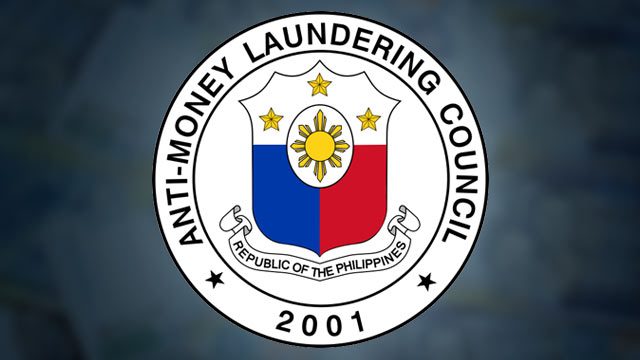
MANILA, Philippines – The Anti-Money Laundering Council (AMLC) has frozen the accounts of 16 groups earlier designated as terrorists by the anti-terror council, but the Communist Party of the Philippines (CPP) said there was nothing to freeze for these “underground groups.”
“In the first place, these organizations are underground and operate clandestinely. Their members numbering in the hundreds or thousands are incognito with no public or secret records of their membership,” said Marco Valbuena, who posts on Twitter official statements and responses of the CPP.
This was the same response of the CPP when the feared anti-terror council designated the New Peoples’ Army (NPA) as terrorists.
On print, the arbitrary designation power of the anti-terror law results only in the freezing of assets, but groups have long feared that because of the the vagueness of the language of the law it may later be used to arrest and detain the designees.
Even on the freezing of assets alone, the CPP said it may be weaponized to target legitimately-established human rights groups. “The AMLC declaration is dangerous because it can be used against social activists, progressives and patriotic forces, human rights defenders and critics of the tyrannical regime who have been repeatedly red-tagged by the NTF-ELCAC/ATC,” said Valbuena.
NTF-ELCAC stands for the National Task Force to end local communist armed conflict, and the ATC stands for the anti-terror council.
Valbuena called the 16 groups as allies of the National Democratic Front of the Philippines or NDFP.
The groups are: Revolutionary Council of Trade Unions (RCTU); Katipunan ng mga Samahang Manggagawa (KASAMA) or Federation of Labor Organizations; Pambansang Katipunan ng Magbubukid (PKM) or National Association of Peasants; Malayang Kilusan ng Bagong Kababaihan (MAKIBAKA) or Patriotic Movement of New Women; Kabataang Makabayan (KM) or Patriotic Youth; Katipunan ng Gurong Makabayan (KAGUMA) or Association of Patriotic Teachers; Makabayang Samahan Pangkalusugan (MASAPA) or Patriotic Health Association; Liga ng Agham para sa Bayan (LAB) or League of Scientists for the People; Lupon ng Manananggol para sa Bayan (LUMABAN) or Committee of Lawyers for the People; Artista at Manunulat para sa Sambayanan (ARMAS) or Artists and Writers for the People; Makabayang Kawaning Pilipino (MKP) or Patriotic Government Employees; Revolutionary Organization of Overseas Filipinos and their Families (COMPATRIOTS); Christians for National Liberation (CNL); Cordillera People’s Democratic Front (CPDF); Moro Resistance and Liberation Organization (MRLO); and Revolutionary Organization of Lumads (ROL).
AMLC issued the resolution freezing their assets on February 22. The designation resolution was issued by the anti-terror council on January 26.
Dangers
The anti-terror council designated the NDF last year as terrorists, which raised the fears even more that political dissenters could be next.
Designating the CPP-NPA was one thing, but the designation of the NDF opened risks for activists who have openly served as consultants to the group.
The Supreme Court has upheld most of the feared law, but petitioners have vowed to appeal it. They are currently drafting their motions for reconsideration, having received the full text of the decision only last February 15.
The Duterte government has launched an intense offensive against activists, both through legal means and through publicity, using the NTF-ELCAC as a vicious instrument to red-tag everyone with the faintest links to progressive groups, including celebrities and journalists.
Chad Booc, a volunteer teacher to the Lumads, petitioned the Supreme Court to void the anti-terror law and was sued by the government for kidnapping, framing the education of Lumads as radicalizing children without consent of their parents. Booc and others were cleared by prosecutors, but the resolution gave the police an opening to file a new complaint somewhere else, and the NTF-ELCAC said it would refile and pursue the charges.
But on February 24, Booc and other community leaders were killed in what the military said was an encounter with NPA rebels. The Save Our Schools (SOS) network, of which Booc belongs, contradicts the military account of an encounter and said Booc and his companions were unarmed and were on an assessment and research trip in Davao. – With a report from Rhoanne De Guzman/Rappler.com
Add a comment
How does this make you feel?
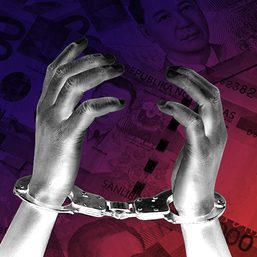
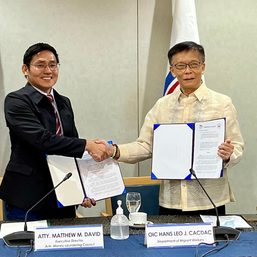
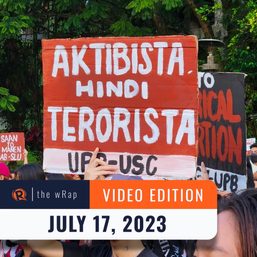
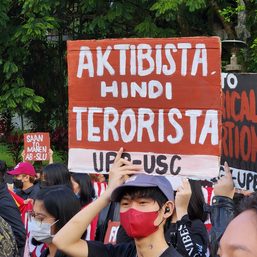
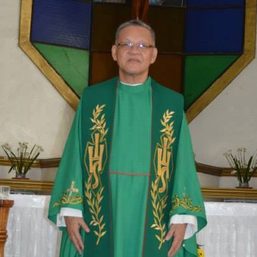
There are no comments yet. Add your comment to start the conversation.